In the ever-evolving world of SEO, staying ahead is crucial. One key aspect of this is understanding your website’s position in search engine results pages (SERPs).
This is where SERP tracking tools come into play. These tools provide valuable insights into your website’s performance in search results. They help you understand how your SEO efforts are paying off.
But with a plethora of SERP tracking tools available, choosing the right one can be challenging. Each tool comes with its unique set of features, pros, and cons. This makes the decision-making process even more complex.
In this article, we aim to simplify this process for you. We will delve into the top 10 SERP tracking tools available in 2024.
Understanding SERP Tracking and Its Importance
SERP tracking, also known as keyword tracking, is a crucial aspect of SEO. It involves monitoring the positions of your website’s keywords in search engine results pages.
This tracking helps you understand how well your SEO strategies are working. It provides insights into which keywords are performing well and which ones need improvement.
But why is SERP tracking so important?
- Competitive Edge: SERP tracking helps you stay ahead of your competitors. By understanding your keyword performance, you can optimize your strategies to outrank your competitors.
- Insights into SEO Performance: SERP tracking provides valuable insights into your SEO performance. It helps you understand which strategies are working and which ones need tweaking.
- Identify Opportunities: With SERP tracking, you can identify opportunities for improvement. You can discover new keywords to target and optimize your content accordingly.
- Measure ROI: SERP tracking allows you to measure the return on investment (ROI) of your SEO efforts. By tracking keyword rankings, you can quantify the success of your strategies.
- Understand Search Trends: SERP tracking helps you understand search trends. You can identify seasonal trends, user behavior, and changes in search algorithms.
In essence, SERP tracking is a vital tool for any SEO professional or website owner. It provides the data needed to optimize your SEO strategies and stay ahead in the digital landscape.
Criteria for Choosing the Best SERP Tracking Tool
There are numerous tools available, each with its unique features and capabilities. So, how do you choose the best one for your needs?
Here are some key criteria to consider:
- Accuracy: The tool should provide accurate and reliable data. It should track keyword rankings precisely across different search engines and locations.
- Frequency of Updates: The tool should provide frequent updates on keyword rankings. Real-time updates can help you react quickly to changes in your SEO performance.
- User Interface: The tool should have a user-friendly interface. It should be easy to navigate and understand, even for beginners.
- Integration: The tool should integrate with other SEO and marketing software. This can help you streamline your workflows and gain more comprehensive insights.
- Scalability: The tool should be scalable. It should be able to handle the tracking needs of your business as it grows.
- Customer Support: The tool should provide excellent customer support. You should be able to reach out to them for help whenever you need it.
Remember, the best SERP tracking tool for you depends on your specific needs and goals. Take the time to evaluate different tools based on these criteria. And don’t forget to take advantage of free trials or demos.
10 Best SERP Tracking Tools
SE Ranking
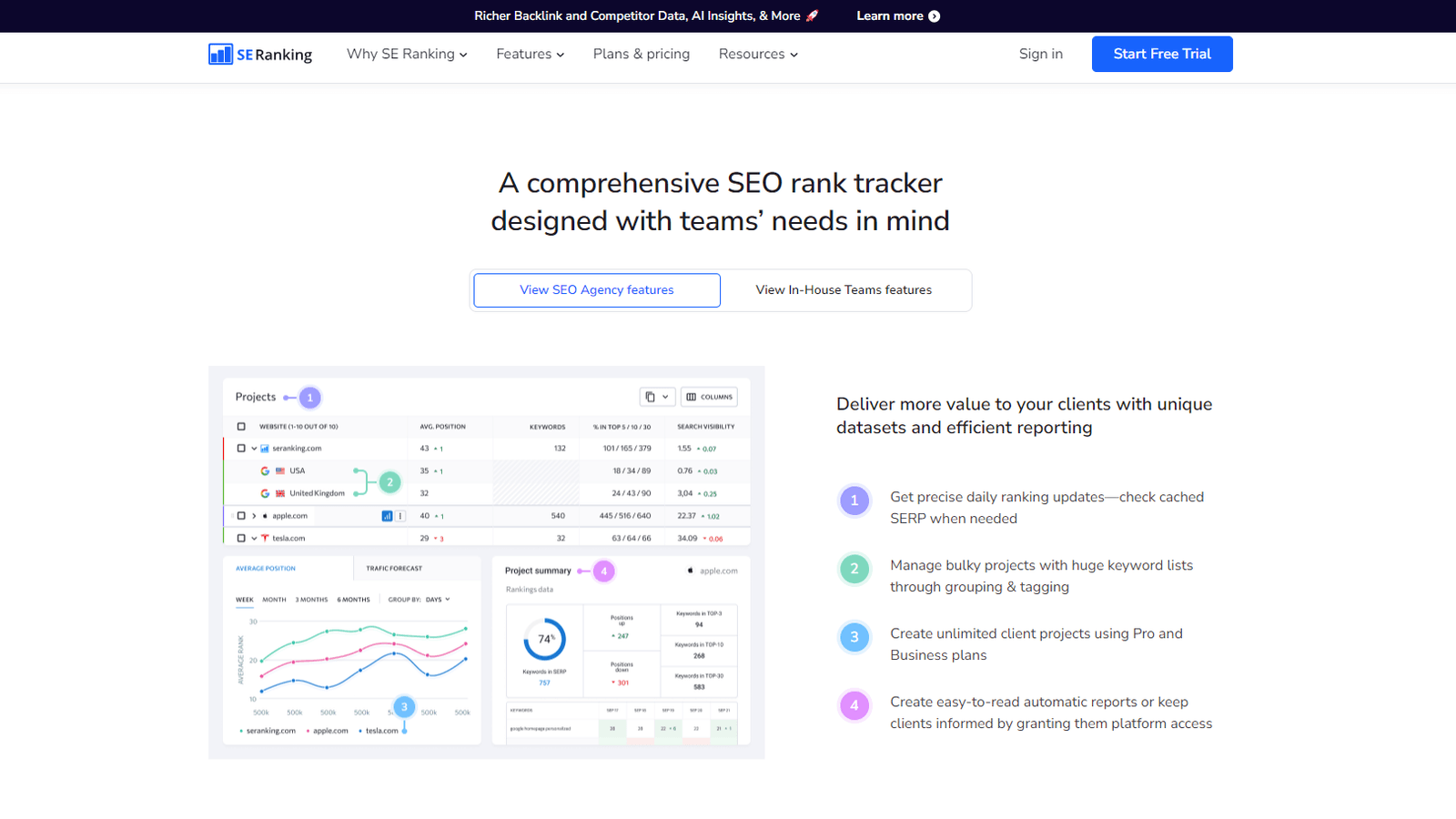
SE Ranking is a versatile SERP tracking tool that caters to businesses of all sizes.
It offers a wide range of features, including keyword rank tracking, competitor analysis, and website audit. One of the standout features of SE Ranking is its accuracy.
The tool updates keyword rankings every day, ensuring you have the most up-to-date data.
SE Ranking also offers a unique feature called “Page Changes Monitoring”. This allows you to track changes on your website and see how they affect your rankings.
The tool also provides comprehensive competitor analysis. You can track your competitors’ rankings, discover their keywords, and analyze their backlinks.
SE Ranking also offers a user-friendly interface. The dashboard is easy to navigate and provides a clear overview of your SEO performance.
The tool also supports multiple search engines and languages. This makes it a great choice for businesses targeting international markets.
SE Ranking is a powerful tool, but it’s not without its drawbacks. Here are some pros and cons to consider.
Pros:
- Accuracy: SE Ranking updates keyword rankings every day, ensuring you have the most up-to-date data.
- Page Changes Monitoring: This unique feature allows you to track changes on your website and see how they affect your rankings.
- User-friendly interface: The dashboard is easy to navigate and provides a clear overview of your SEO performance.
Cons:
- Limited integrations: While SE Ranking integrates with Google Analytics and Google Search Console, it lacks integrations with other SEO and marketing tools.
- No mobile app: Unlike some other SERP tracking tools, SE Ranking does not offer a mobile app for on-the-go monitoring.
- Pricing: While SE Ranking offers a range of pricing plans, the more advanced features are only available on the higher-priced plans.
AccuRanker
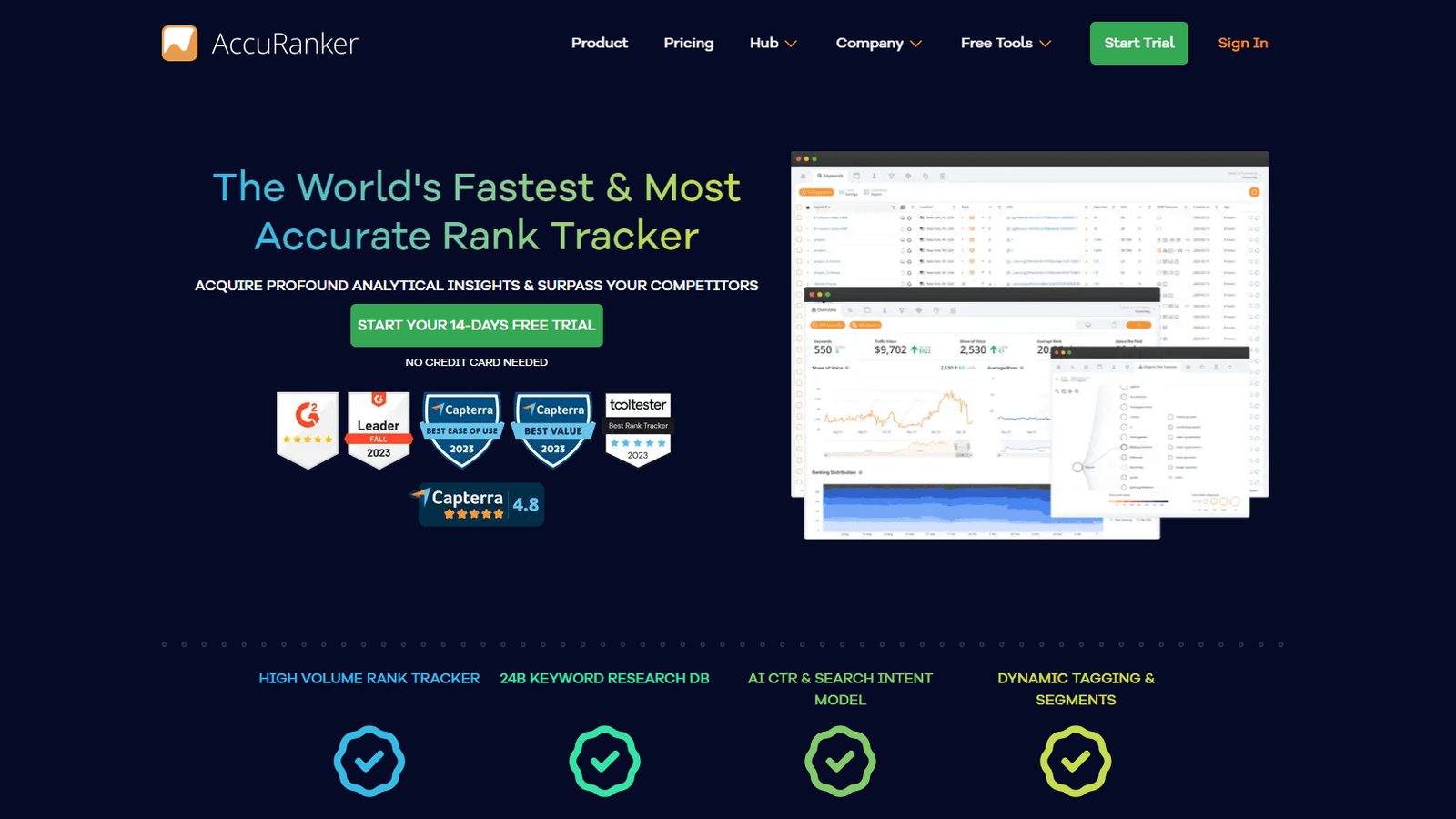
AccuRanker is a dedicated SERP tracking tool known for its speed and accuracy.
It’s designed for agencies and SEO professionals who need to track a large number of keywords.
AccuRanker updates keyword rankings every 24 hours, or on-demand. This ensures you always have the most recent data at your fingertips.
One of the standout features of AccuRanker is its “Share of Voice” metric. This shows you how much of the total search volume for your tracked keywords you’re capturing.
AccuRanker also offers a comprehensive competitor analysis feature. You can track your competitors’ rankings, discover their keywords, and analyze their backlinks.
The tool also provides detailed reporting and data visualization features.
You can create custom reports and share them with your team or clients. AccuRanker also integrates with Google Analytics, Google Search Console, and Adobe Analytics. This allows you to combine your SERP data with other key SEO metrics.
Like any tool, AccuRanker has its strengths and weaknesses. Here are some pros and cons to consider:
Pros:
- Speed and accuracy: AccuRanker updates keyword rankings every 24 hours, or on-demand, ensuring you have the most recent data.
- Share of Voice metric: This unique feature shows you how much of the total search volume for your tracked keywords you’re capturing.
- Comprehensive reporting: AccuRanker offers detailed reporting and data visualization features, allowing you to create custom reports.
Cons:
- No mobile app: Unlike some other SERP tracking tools, AccuRanker does not offer a mobile app for on-the-go monitoring.
- Limited keyword tracking on lower plans: While AccuRanker is great for tracking a large number of keywords, the number of keywords you can track is limited on the lower-priced plans.
- No local rank tracking: AccuRanker does not offer local rank tracking, which may be a drawback for businesses focusing on local SEO.
Google Search Console
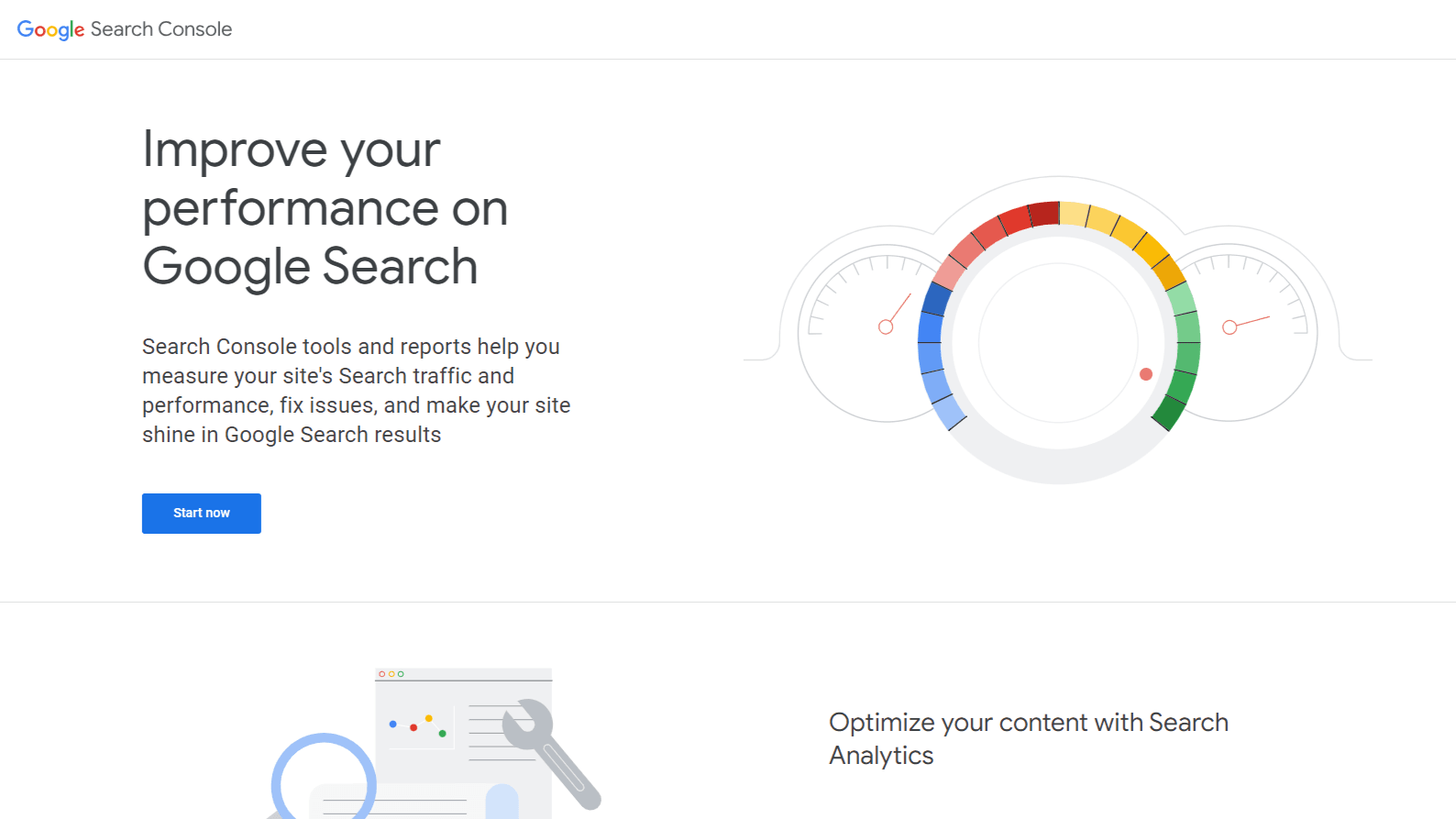
Google Search Console is a powerful tool that plays a vital role in monitoring and optimizing your website’s performance in Google search results.
This invaluable tool provides insights into how people find your site through organic search.
Pros:
- Insightful Data: Google Search Console provides valuable insights into how your website is performing in Google search results. It offers information on keywords, clicks, impressions, and more, helping you understand your site’s visibility.
- Performance Tracking: With Google Search Console, you can track the performance of your website’s pages in search results. It allows you to monitor changes in rankings, click-through rates, and other essential metrics.
- Indexing Control: This tool enables you to submit sitemaps, request indexing for new content, and identify indexing issues that may affect your site’s visibility on Google.
- Mobile Usability: Google Search Console includes a mobile usability report that helps you identify and fix issues that could impact your site’s performance on mobile devices.
- Structured Data: It provides insights into your site’s structured data markup, helping you ensure that Google can understand and display your content correctly in search results.
Cons:
- Focus on Google Only: As the name suggests, Google Search Console focuses solely on Google search results. It does not offer insights into other search engines or platforms.
- Learning Curve: For beginners, Google Search Console may have a learning curve due to its technical nature and the depth of data it provides.
- Data Delay: The data in Google Search Console can be delayed by a few days, which may affect the real-time monitoring of your site’s performance.
- Limited Keyword Insights: While it provides keyword data, Google Search Console does not offer as comprehensive keyword tracking features as some specialized SERP tracking tools.
Semrush
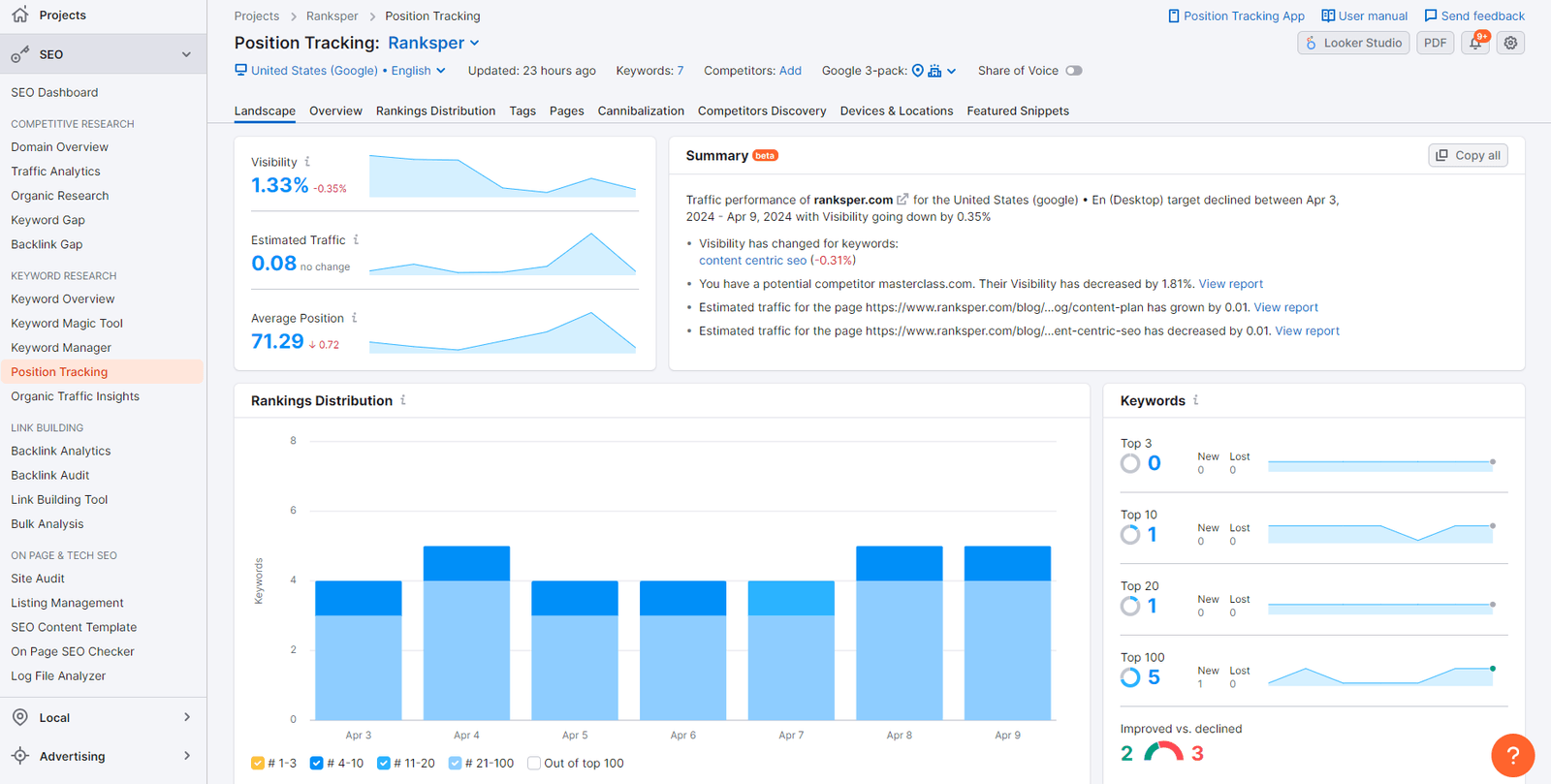
Semrush is a well-known name in the SEO industry.
It’s a comprehensive digital marketing suite that includes a robust SERP tracking tool. Semrush allows you to track keyword rankings on multiple search engines, including Google, Bing, and Yahoo.
It also supports tracking for both desktop and mobile devices.
One of the standout features of SEMRush is its competitor analysis. You can compare your keyword rankings with those of your competitors. This can provide valuable insights into your competitors’ SEO strategies.
Semrush also offers detailed SERP analysis, including data on top-ranking pages and their backlinks.
It integrates with Google Analytics, allowing you to combine your SERP data with other key SEO metrics. Semrush also offers a free trial, allowing you to test out its features before committing to a subscription.
Pros:
- Comprehensive SEO platform: Semrush is more than just a SERP tracking tool. It offers a range of SEO tools, including keyword research, backlink analysis, and competitor analysis.
- Competitor analysis: Semrush allows you to compare your keyword rankings with those of your competitors, providing valuable insights into their SEO strategies.
- Free trial: Semrush offers a free trial, allowing you to test out its features before committing to a subscription.
Cons:
- Complex interface: Semrush’s interface can be overwhelming for beginners. It may take some time to learn how to use all of its features.
- Limited customer support: Some users have reported that Semrush’s customer support can be slow to respond to queries.
- No real-time tracking: Unlike some other SERP tracking tools, Semrush does not offer real-time tracking or alerts for changes in keyword rankings.
Mangools SERPWatcher
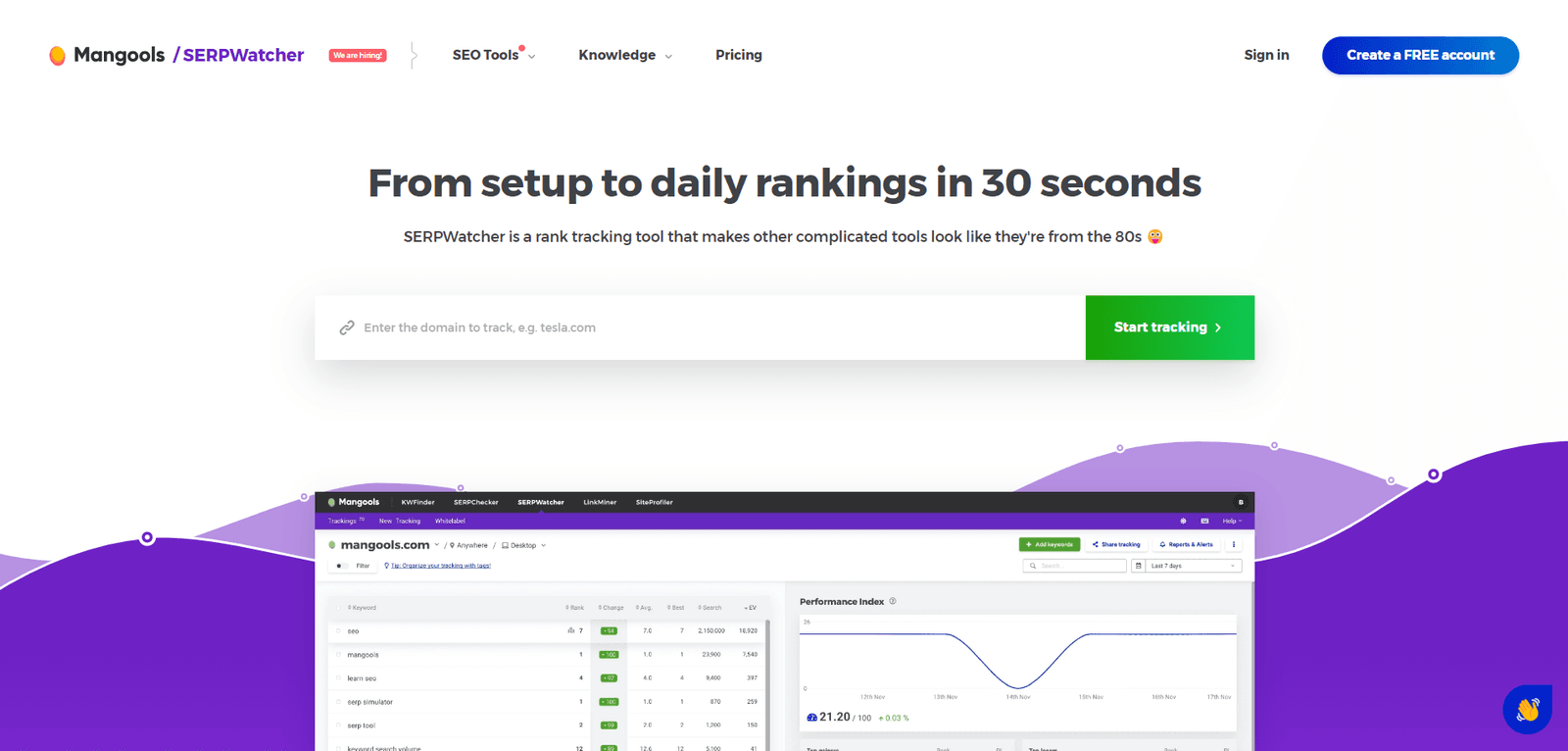
Mangools is a suite of SEO tools that includes SERPChecker and SERPWatcher.
These two tools work together to provide comprehensive SERP tracking. SERPChecker allows you to analyze SERP results for specific keywords.
It provides data on the top-ranking pages, including their backlinks and social signals.
SERPWatcher, on the other hand, is a rank tracking tool. It allows you to monitor your keyword rankings over time.
One of the standout features of Mangools is its user-friendly interface. Both SERPChecker and SERPWatcher are easy to use, even for beginners.
Mangools also offers a free trial, allowing you to test out its features before committing to a subscription.
Pros:
- User-friendly interface: Both SERPChecker and SERPWatcher are easy to use, even for beginners.
- Comprehensive SERP analysis: SERPChecker provides detailed data on the top-ranking pages for specific keywords, including their backlinks and social signals.
- Free trial: Mangools offers a free trial, allowing you to test out its features before committing to a subscription.
Cons:
- Limited features: Compared to other SERP tracking tools, Mangools offers fewer features.
Ahrefs
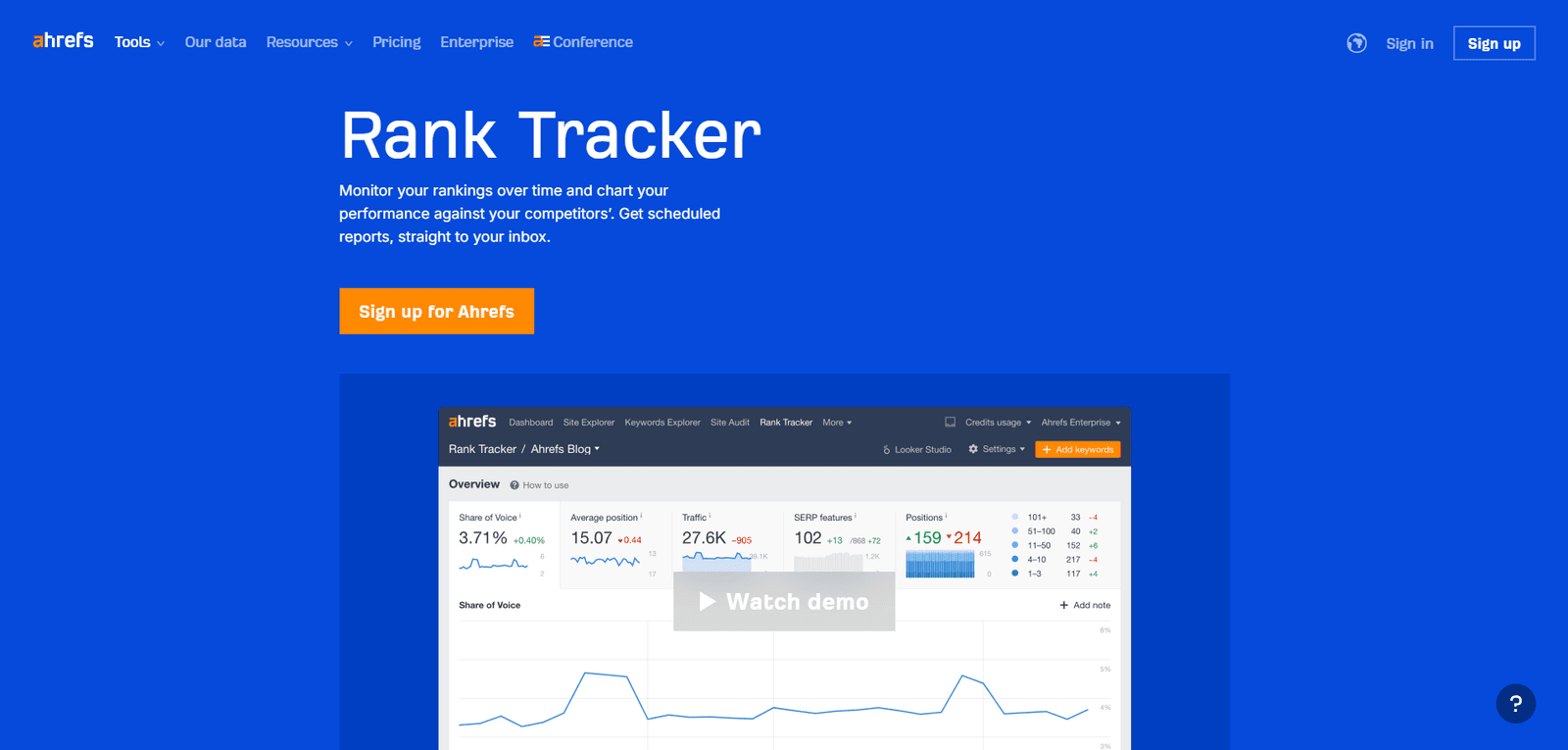
Ahrefs is a comprehensive SEO toolset that includes a powerful SERP tracking feature. It’s widely used by SEO professionals and digital marketers worldwide.
Ahrefs’ SERP tracking tool, known as Rank Tracker, allows you to monitor your website’s rankings for specific keywords.
You can track your rankings on different search engines, including Google, Bing, and YouTube. Ahrefs updates keyword rankings every 7 days for all tracked keywords.
This ensures you have up-to-date data to inform your SEO strategies.
One of the standout features of Ahrefs’ Rank Tracker is its competitor comparison feature. You can compare your website’s rankings with up to 10 competitors for any keyword.
Ahrefs also provides detailed SERP analysis. This includes data on top-ranking pages, their backlinks, and keyword usage. Ahrefs integrates with Google Analytics, allowing you to combine your SERP data with other key SEO metrics.
Pros:
- Comprehensive SEO toolset: Ahrefs offers a wide range of SEO tools, including backlink analysis, keyword research, and content analysis.
- Detailed SERP analysis: Ahrefs provides detailed data on top-ranking pages, their backlinks, and keyword usage.
- Competitor comparison: You can compare your website’s rankings with up to 10 competitors for any keyword.
Cons:
- Price: Ahrefs is one of the more expensive SERP tracking tools on the market, which may be a barrier for small businesses or freelancers.
- Complexity: Ahrefs offers a lot of data, which can be overwhelming for beginners or those with simpler SEO needs.
- No real-time updates: Ahrefs updates keyword rankings every 7 days, which may not be frequent enough for some users.
Serpwatch
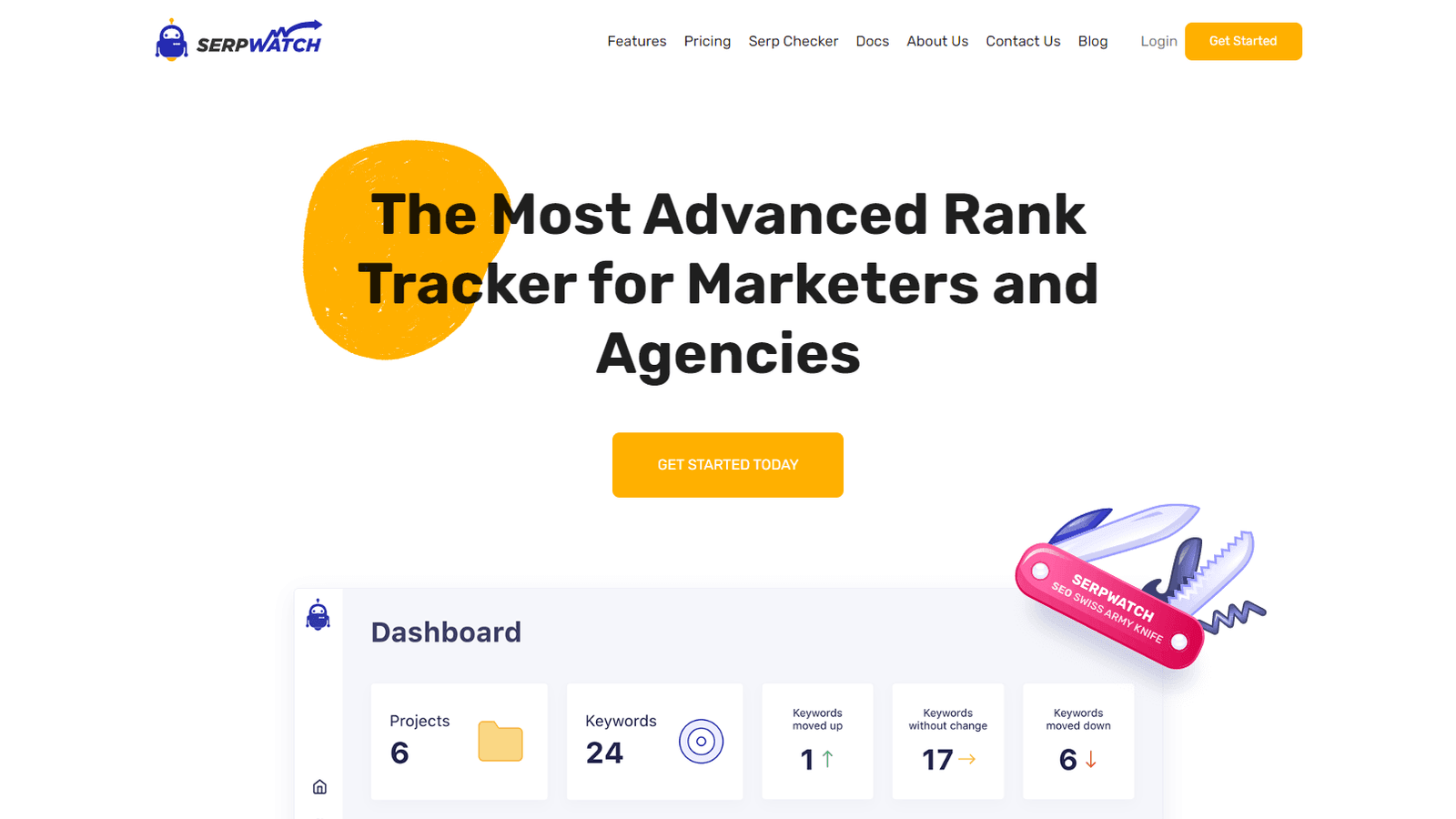
Serpwatch is a user-friendly SERP tracking tool designed for businesses of all sizes.
It offers a clean, intuitive interface that makes tracking keyword rankings a breeze.
Serpwatch allows you to track keyword rankings on multiple search engines, including Google, Bing, and Yahoo. It also supports tracking for both desktop and mobile devices.
One of the standout features of Serpwatch is its real-time tracking and alerts. You can set up alerts for significant changes in your keyword rankings. This allows you to respond quickly to changes in your SEO performance.
Serpwatch also offers detailed SERP analysis, including data on top-ranking pages and their backlinks.
It integrates with Google Analytics, allowing you to combine your SERP data with other key SEO metrics. Serpwatch also offers a free trial, allowing you to test out its features before committing to a subscription.
Pros:
- User-friendly interface: Serpwatch offers a clean, intuitive interface that makes tracking keyword rankings easy.
- Real-time tracking and alerts: You can set up alerts for significant changes in your keyword rankings, allowing you to respond quickly to changes in your SEO performance.
- Free trial: Serpwatch offers a free trial, allowing you to test out its features before committing to a subscription.
Cons:
- No competitor comparison: Unlike some other SERP tracking tools, Serpwatch does not offer a competitor comparison feature.
- Limited integration options: While Serpwatch integrates with Google Analytics, it lacks integration with other SEO and marketing tools.
Serpstat
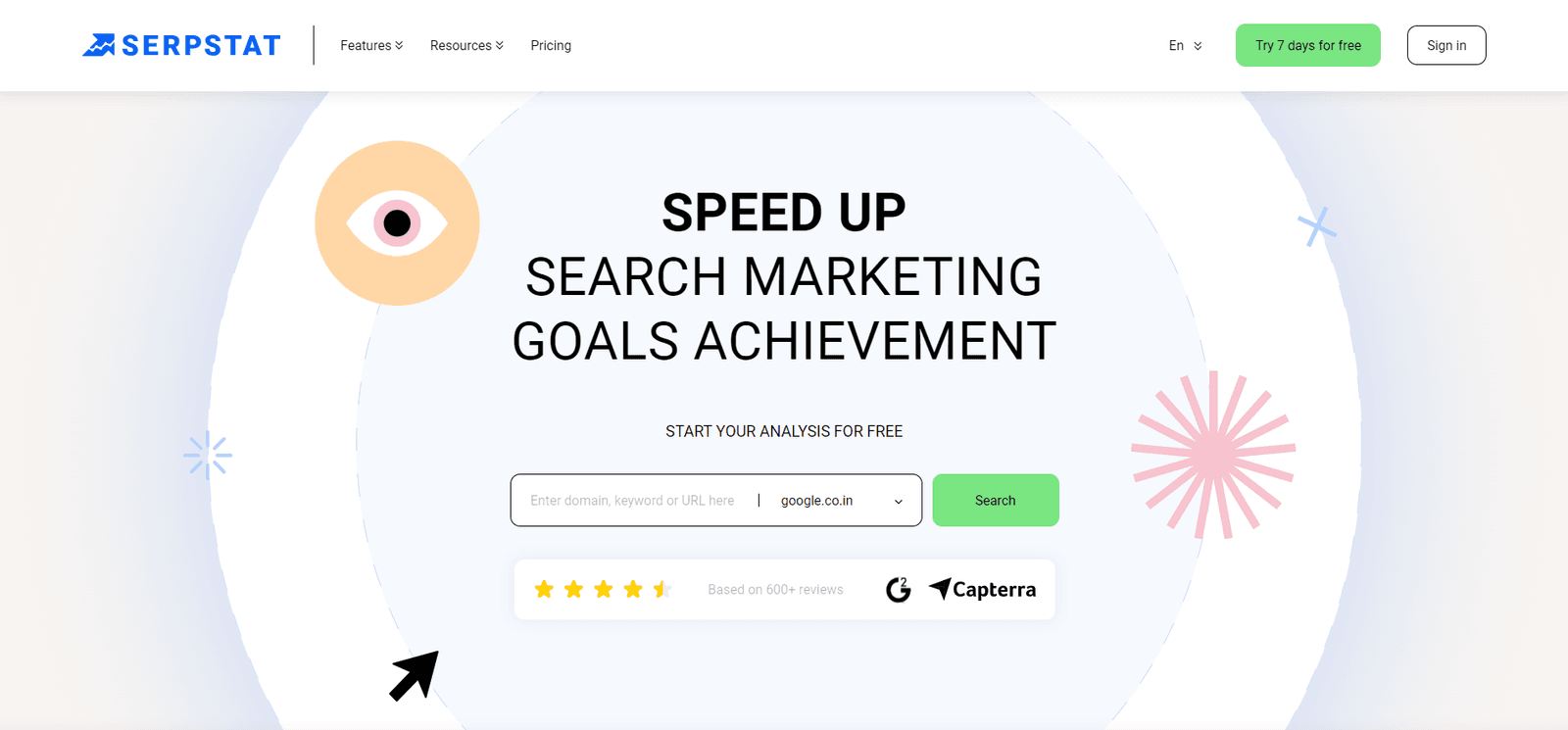
Serpstat is a comprehensive SEO platform that includes a powerful SERP tracking tool.
It’s designed for SEO professionals, digital marketers, and businesses of all sizes.
Serpstat allows you to track keyword rankings on multiple search engines, including Google, Bing, and Yahoo. It also supports tracking for both desktop and mobile devices.
Pros:
- Comprehensive SEO platform: Serpstat is more than just a SERP tracking tool. It offers a range of SEO tools, including keyword research, backlink analysis, and competitor analysis.
- Competitor analysis: Serpstat allows you to compare your keyword rankings with those of your competitors, providing valuable insights into their SEO strategies.
- Free trial: Serpstat offers a free trial, allowing you to test out its features before committing to a subscription.
Cons:
- Complex interface: Serpstat’s interface can be overwhelming for beginners. It may take some time to learn how to use all of its features.
- Limited customer support: Some users have reported that Serpstat’s customer support can be slow to respond to queries.
- No real-time tracking: Unlike some other SERP tracking tools, Serpstat does not offer real-time tracking or alerts for changes in keyword rankings.
SERPWoo
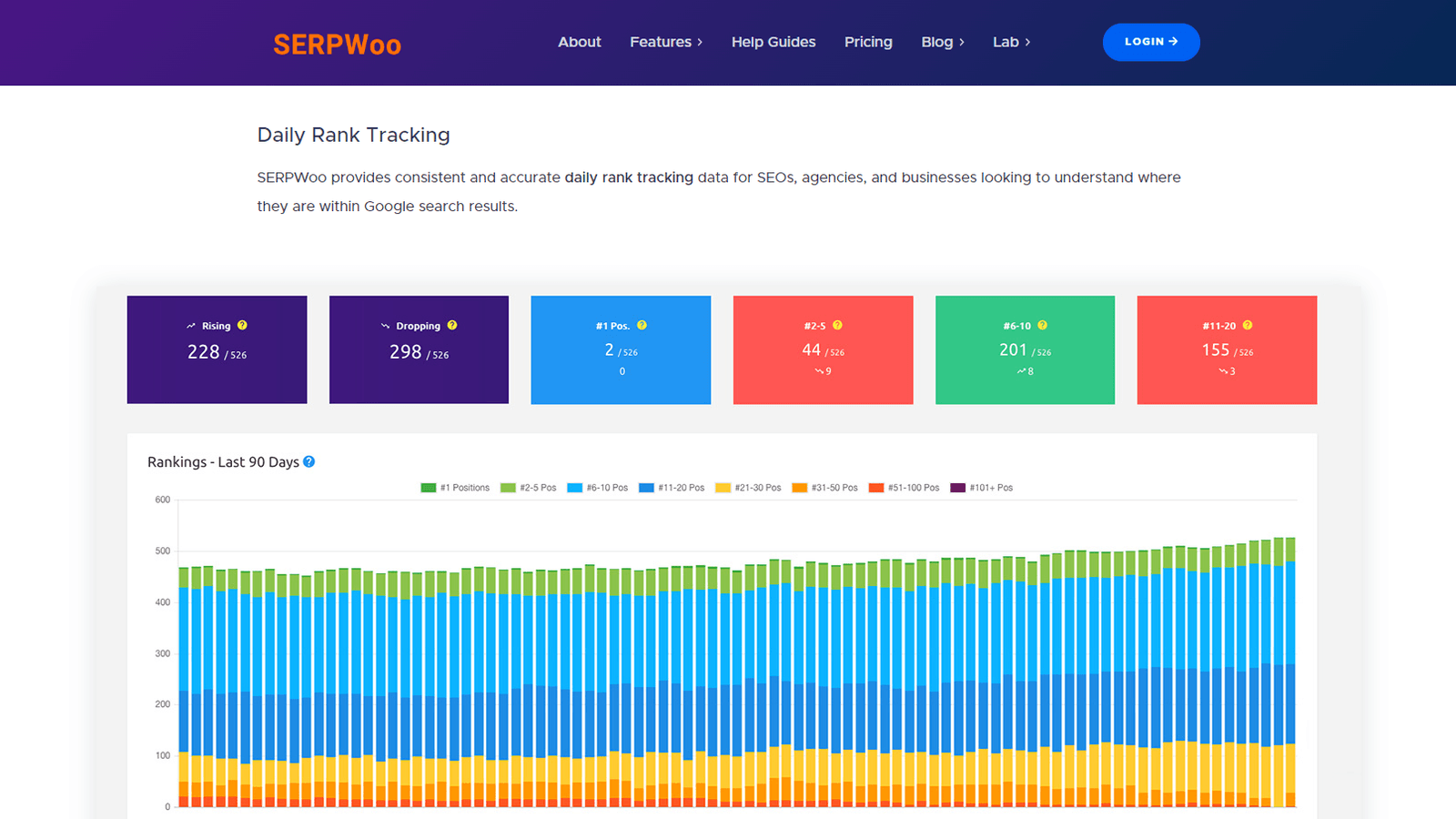
SERPWoo is a powerful SERP tracking tool that stands out for its unique approach to keyword tracking.
Instead of focusing solely on your website’s rankings, SERPWoo tracks the entire SERP landscape. This gives you a broader view of the competition and market trends.
SERPWoo offers real-time tracking for your keywords. It monitors changes in the SERP and alerts you to any significant shifts. This tool is also known for its robust competitor analysis features.
It allows you to identify new competitors, track their performance, and gain insights into their strategies.
SERPWoo also offers a feature called “SERP Archives”. This feature provides historical SERP data, allowing you to analyze trends and changes over time.
The tool supports tracking for multiple search engines and locations. This makes it a great choice for businesses targeting international markets or local SEO.
SERPWoo also integrates with other SEO tools and services.
Pros:
- Comprehensive SERP tracking: SERPWoo tracks the entire SERP, not just your website’s rankings. This gives you a broader view of the competition and market trends.
- Robust competitor analysis: The tool allows you to identify new competitors, track their performance, and gain insights into their strategies.
- Historical SERP data: SERPWoo provides historical SERP data, allowing you to analyze trends and changes over time.
Cons:
- Complexity: SERPWoo’s comprehensive features can be overwhelming for beginners. It may take some time to learn how to use the tool effectively.
- Pricing: While SERPWoo offers a range of pricing plans, it can be expensive for small businesses or individuals.
Sitechecker.pro
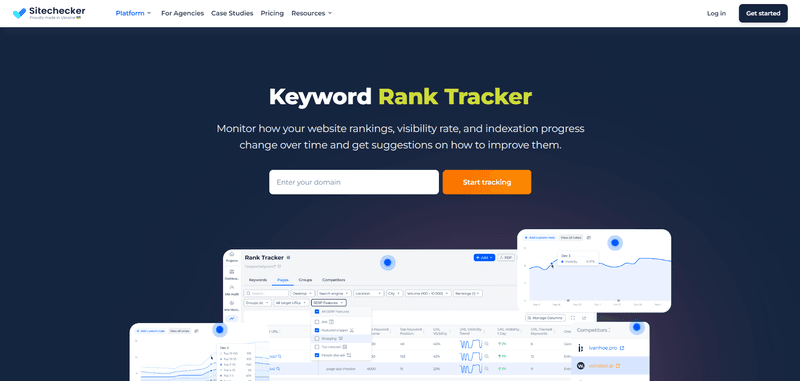
Sitechecker.pro is a comprehensive SEO platform that includes a robust SERP tracking tool. This tool allows you to monitor your keyword rankings across multiple search engines.
One of the standout features of Sitechecker.pro is its on-page SEO checker. This feature allows you to analyze your web pages for SEO issues that could be affecting your rankings.
Sitechecker.pro also offers a backlink tracker. This tool helps you monitor your backlink profile and identify opportunities for link building.
Another useful feature is the website change monitoring tool. This tool alerts you to any changes on your website that could impact your SEO.
Sitechecker.pro also offers a free version of its tool, although this has limited features.
Pros:
- Comprehensive SEO platform: Sitechecker.pro offers a range of SEO tools, including a SERP tracker, on-page SEO checker, and backlink tracker.
- Multiple search engines: The SERP tracker allows you to monitor your keyword rankings across multiple search engines.
- Website change monitoring: This feature alerts you to any changes on your website that could impact your SEO.
Cons:
- Limited free version: While Sitechecker.pro does offer a free version of its tool, this has limited features.
- Limited customer support: Some users have reported that Sitechecker.pro’s customer support can be slow to respond to queries.
The Evolving Landscape of SERP Features in 2024
The landscape of Search Engine Results Pages (SERPs) has evolved significantly over the years.
In 2024, we see a more dynamic and feature-rich SERP than ever before.
Google, in particular, has introduced a variety of SERP features that go beyond the traditional organic search results. These include featured snippets, local pack results, knowledge panels, and more.
These SERP features have a significant impact on SEO strategies. They can influence click-through rates, user engagement, and overall website traffic.
Therefore, it’s crucial for SEO professionals to understand these features and how they can optimize their content to appear in them.
Here are some key SERP features to consider in 2024:
- Featured snippets: These are selected search results that appear at the top of Google’s organic results. They aim to answer the user’s question directly on the SERP.
- Local pack results: These are a group of businesses that appear on the first page of Google’s organic results for local search queries.
- Knowledge panels: These are boxes that appear on Google’s results page when you search for entities such as businesses, people, places, or things.
- People Also Ask boxes: These are a series of questions that Google believes are related to the user’s search query.
- Image and video results: Google often includes image and video results on its SERPs, especially for queries that are visually oriented.
Understanding these SERP features and how to optimize for them is a crucial part of modern SEO. SERP tracking tools can help you monitor your performance in these features and adjust your strategies accordingly.
The Impact of AI and Machine Learning on SERP Tracking Tools
Artificial Intelligence (AI) and Machine Learning (ML) have revolutionized many industries, and SEO is no exception.
These technologies have significantly impacted the capabilities of SERP tracking tools.
AI and ML enable these tools to analyze vast amounts of data quickly and accurately. They can identify patterns and trends that would be impossible for humans to detect manually.
This allows for more precise tracking and forecasting of SERP positions, helping SEO professionals make more informed decisions.
Here are some ways AI and ML have enhanced SERP tracking tools:
- Predictive Analytics: AI and ML can analyze historical data to predict future SERP positions. This helps in planning and adjusting SEO strategies proactively.
- Personalized Insights: These technologies can provide personalized insights based on a website’s specific SEO performance and industry trends.
- Automated Reporting: AI and ML can automate the generation of detailed reports, saving time and reducing the risk of human error.
- Advanced Keyword Analysis: These technologies can analyze keywords in a more nuanced way, considering factors like search intent and semantic variations.
- Competitor Analysis: AI and ML can help identify what strategies are working for competitors based on their SERP positions.
- Algorithm Updates: These technologies can help SERP tracking tools adapt quickly to search engine algorithm updates, ensuring accurate tracking.
The integration of AI and ML in SERP tracking tools has made them more powerful and efficient. They are now capable of providing deeper insights and more accurate predictions, making them an indispensable tool for modern SEO professionals.
Conclusion
Choosing the right SERP tracking tool is crucial for your SEO success.
The tool you select should align with your specific needs and objectives.
Consider factors such as the size of your website, the number of keywords you need to track, and your budget. Also, consider the tool’s ease of use, the accuracy of its data, and the quality of its customer support.
Remember, the best SERP tracking tool is not necessarily the most expensive or the most feature-rich.
It’s the one that best fits your needs and helps you achieve your SEO goals.





